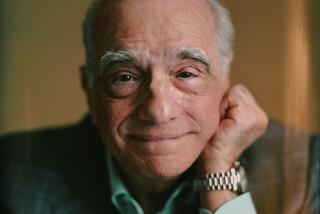Review: ‘The Great Beauty’ intoxicates with masterful Toni Servillo
As its name promises, “The Great Beauty” is drop-dead gorgeous, a film that is luxuriously, seductively, stunningly cinematic. But more than intoxicating imagery is on director Paolo Sorrentino’s mind, a lot more.
One of Italy’s most impressive contemporary filmmakers, Sorrentino has a superb sense of how to fill a wide screen and, working with his longtime cinematographer Luca Bigazzi, a wizard with camera movement, his visuals display the intoxicating richness of color 35-millimeter film in a way few contemporary ventures can match. When Sorrentino says in the press notes that “a single shot, if well thought out and balanced, can enthrall and say more than ten pages of dialogue,” he’s as good as his word.
But because Sorrentino is reunited as well with his signature actor, the masterful Toni Servillo, remarkable as Italian career politician Giulio Andreotti in the director’s best known film, “Il Divo,” it’s a given that ideas and emotions will be as important here as the images.
PHOTOS: Behind the scenes of movies and TV
What Sorrentino (who co-wrote the script with Umberto Contarello) and his team have created is a portrait of a country, a city and, most of all, a suave and unflappable man. That would be Jep Gambardella, Rome’s unofficial “king of the high life” and party chronicler without equal.
Talking in voice-over, Jep informs us he came to Rome from Naples when he was 26: “I didn’t want to simply be a socialite, I wanted to become the king of socialites. And I succeeded. I didn’t just want to attend parties. I wanted the power to make them fail.”
How well Jep succeeded is visible in “The Great Beauty’s” first major set piece, the orgiastic phantasmagoria of his 65th birthday party set in his showcase apartment overlooking the Coliseum. Jep is glimpsed on the dance floor as completely radiant with joy as only the man of the moment, the hour and the decade can be.
But we soon find out there is more to Jep than we initially understand. Forty years earlier he wrote a novel, “The Human Apparatus,” that was so perceptive people continue to ask him why he hasn’t written another. Even his editor, Dadina (Giovanna Vignola), an acerbic dwarf, tells him his career has not delivered on the potential his talent promised.
“The Great Beauty” is too sophisticated a film to have Jep dissolve in a welter of regret. Immaculately turned out in a series of custom tailored suits and dazzling sports coats, Jep continues to experience the pull of his accustomed world, but he starts to feel as well that he no longer wants to do things he doesn’t want to do.
PHOTOS: Holiday movie sneaks 2013
More than that, after hearing some startling news that recalls his very first love affair, Jep starts to think about larger questions. He tries to decide what of value has mattered to him in his life, and whether that can still matter again.
Part of this process becomes a search for the kind of human connection Jep has mostly kept at arm’s length, a search that comes to include interactions with two very different women, a high-class striptease artiste named Ramona (Sabrina Ferilli) and a Mother Teresa-type saint (Giusi Merli) who isn’t comfortable unless she can sleep on the floor.
Because this is Rome, and because Jep is primarily a journalist, comparisons between “The Great Beauty” and Federico Fellini’s “La Dolce Vita” are inevitable, especially because Sorrentino says Fellini’s films “are indelibly stamped on me and may have guided my film.”
But this is Italy more than half a century later, the time of the somehow bleaker excesses of the Berlusconi era, and the oddities that Jep witnesses, from a maestro of Botox to a Marina Abramovic-type performance artist named Talia Concept, seem increasingly dissipated and disillusioning.
Adding a key element to Sorrentino’s world is his exceptional use of music, “an inevitable mix of the sacred and the profane, just as Rome famously is,” the director says, which specifically means modern music by composers like Henryk Gorecki and David Lang combined with Italian pop anthems. What we hear is always unexpected but completely appropriate.
The same can be said for the film’s often startling imagery, which includes a flock of flamingos on Jep’s terrace and an enormous giraffe in ancient ruins. Rome never looked more beautiful, and the acting ability of Servillo, who can do more with less than almost any actor going, makes this a personal journey well worth experiencing.
----------------------------------
‘The Great Beauty’
No MPAA rating
Running time: 2 hours, 22 minutes
Playing: At Nuart, West Los Angeles
More to Read
Only good movies
Get the Indie Focus newsletter, Mark Olsen's weekly guide to the world of cinema.
You may occasionally receive promotional content from the Los Angeles Times.











